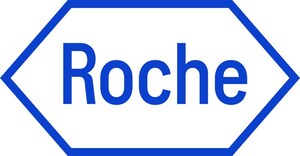Roche receives FDA clearance for the VENTANA MMR IHC Panel for patients diagnosed with colorectal cancer
-- The VENTANA MMR IHC Panel1 helps differentiate between sporadic colorectal cancer and probable Lynch syndrome, a hereditary form of colorectal cancer
-- The National Comprehensive Cancer Network recommends universal screening of all newly diagnosed colorectal cancers for Lynch syndrome
-- Identification of probable Lynch syndrome allows clinicians to recommend additional testing and genetic counseling to patients and at-risk family members, with the goal of reducing disease and death
TUCSON, Arizona, Nov. 14, 2017 /PRNewswire/ -- Roche (SIX: RO, ROG; OTCQX: RHHBY) today announced US Food & Drug Administration (FDA) clearance of the VENTANA MMR IHC Panel, which provides clinicians with a comprehensive group of immunohistochemistry (IHC) tests for patients diagnosed with colorectal cancer. The tests detect certain proteins associated with a DNA repair mechanism called mismatch repair (MMR), and aid in differentiating between sporadic colorectal cancer and probable Lynch syndrome, a hereditary form of colorectal cancer. About 3 percent of colorectal cancers are associated with Lynch syndrome.2
The panel of five assays includes four that target MMR proteins MLH1, MSH2, MSH6 and PMS2, as well as the VENTANA BRAF V600E (VE1) assay. This is the first FDA clearance of an IHC panel of this type.
Colorectal cancer, the third leading cause of cancer-related deaths in women in the US and the second leading cause in men, is expected to result in more than 50,000 deaths in the US in 2017.3 Increasingly, guidelines, including those from the National Comprehensive Cancer Network, are recommending universal screening of all newly diagnosed colorectal cancers for Lynch syndrome.
Lynch syndrome results in a 50 to 80 percent lifetime risk of developing colorectal cancer,4 making it important to identify the syndrome in colorectal cancer patients and at-risk family members. Identification of the syndrome may result in early detection and possible cancer prevention among those with the inherited mutation.5
"The VENTANA MMR IHC Panel provides clinicians with an additional tool to perform universal tumor screening for probable Lynch syndrome as recommended by medical guidelines," said Ann Costello, Head of Roche Tissue Diagnostics. "The FDA clearance is a major milestone because this testing impacts not just the patient, but family members who may benefit from further genetic testing and advanced monitoring to detect colorectal cancer at its earlier stages, when it is more treatable."
The VENTANA MMR IHC Panel is available for use on the BenchMark ULTRA instrument.
About the VENTANA MMR IHC Panel
The FDA-cleared VENTANA MMR IHC Panel consists of VENTANA anti-MLH1 (M1), VENTANA anti-PMS2 (A16-4), VENTANA anti-MSH2 (G219-1129), VENTANA anti-MSH6 (SP93) antibodies, for patients diagnosed with colorectal cancers for the detection of mismatch repair protein deficiency as an aid in the identification of probable Lynch syndrome, and VENTANA BRAF V600E (VE1) antibody as an aid to differentiate between sporadic colorectal cancer and probable Lynch syndrome.
The VENTANA MMR IHC Panel is the first panel of this type to receive FDA clearance.
The inclusion of the VENTANA BRAF V600E (VE1) antibody helps refine the number of patients who may receive additional testing for Lynch syndrome by aiding in the differentiation between sporadic colorectal cancer and probable Lynch syndrome in the absence of MLH1 protein expression.
The ready-to-use VENTANA MMR IHC Panel is optimized for use with the OptiView DAB IHC Detection Kit, OptiView Amplification Kit and ancillaries on the fully-automated BenchMark ULTRA system.
About Roche
Roche is a global pioneer in pharmaceuticals and diagnostics focused on advancing science to improve people's lives. The combined strengths of pharmaceuticals and diagnostics under one roof have made Roche the leader in personalised healthcare – a strategy that aims to fit the right treatment to each patient in the best way possible.
Roche is the world's largest biotech company, with truly differentiated medicines in oncology, immunology, infectious diseases, ophthalmology and diseases of the central nervous system. Roche is also the world leader in in vitro diagnostics and tissue-based cancer diagnostics, and a frontrunner in diabetes management.
Founded in 1896, Roche continues to search for better ways to prevent, diagnose and treat diseases and make a sustainable contribution to society. The company also aims to improve patient access to medical innovations by working with all relevant stakeholders. Thirty medicines developed by Roche are included in the World Health Organization Model Lists of Essential Medicines, among them life-saving antibiotics, antimalarials and cancer medicines. Roche has been recognised as the Group Leader in sustainability within the Pharmaceuticals, Biotechnology & Life Sciences Industry nine years in a row by the Dow Jones Sustainability Indices (DJSI).
The Roche Group, headquartered in Basel, Switzerland, is active in over 100 countries and in 2016 employed more than 94,000 people worldwide. In 2016, Roche invested CHF 9.9 billion in R&D and posted sales of CHF 50.6 billion. Genentech, in the United States, is a wholly owned member of the Roche Group. Roche is the majority shareholder in Chugai Pharmaceutical, Japan. For more information, please visit www.roche.com.
VENTANA, BENCHMARK, ULTRA and OPTIVIEW are trademarks of Roche. Other product names and trademarks are the property of their respective owners.
1This product is intended for in vitro diagnostic (IVD) use
2Sehgal R, Sheahan K, O'Connell PR et al. Lynch syndrome: an updated review. Genes (Basel), 2014;5:497–507
3American Cancer Society, https://www.cancer.org/cancer/colon-rectal-cancer/about/key-statistics.html
4Buza N, Ziai J, Hui P. Mismatch repair deficiency testing in clinical practice, Expert Review of Molecular Diagnostics, 2016;16:591-604; Connell LC, Mota JM, Braghiroli MI et al. The Rising Incidence of Younger Patients With Colorectal Cancer: Questions About Screening, Biology, and Treatment, Current Treatment Options in Oncology. 2017;18:23
5Provenzale D, Gupta S, Ahnen DJ, et al. Genetic/Familial High-Risk Assessment: Colorectal Version 1.2016, NCCN Clinical Practice Guidelines in Oncology. J National Comprehensive Cancer Network. 2016;14:1010–1030
Roche Tissue Diagnostics Media Relations
Gabrielle Fimbres
Senior Manager, External Communications
Phone: +1 520.222.4573
Email: gabrielle.fimbres@roche.com
ventana.com
Photo - https://mma.prnewswire.com/media/604013/Roche_5_stains_VENTANA_MMR_IHC_Panel.jpg





Share this article